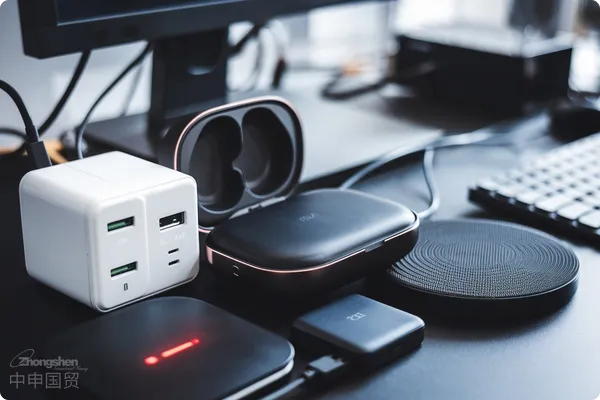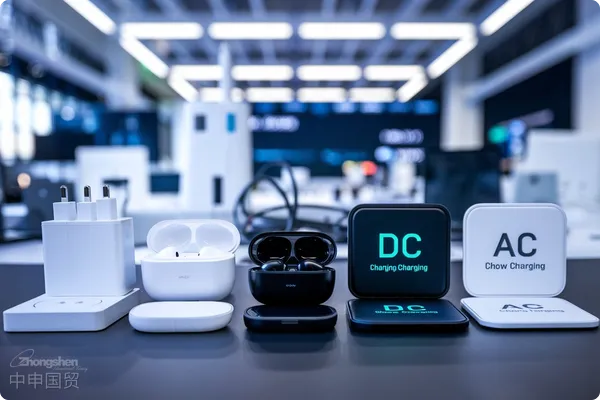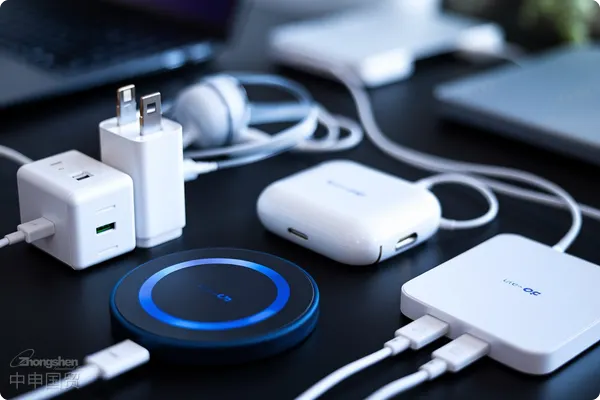- Shanghai Zhongshen International Trade Co., Ltd. - Two decades of trade agency expertise.
- Service Hotline: 139 1787 2118
With the advancement of global technology, the demand for charging devices has been increasing year by year. From power adapters to wireless charging pads, and even electric vehicle charging stations, various charging devices are widely used in daily life and industrial applications. To help enterprises smoothly conduct export business for charging devices, this article will detailEquipment Exportthe relevant requirements and considerations to ensure compliance and efficient customs clearance.

I. Types of Charging Devices and HS Code Classification
According to the latest HS Code directory, various charging devices should be classified based on their specific functions and uses, as follows:
Power Adapters
- HS 編碼:8504.40.99
- Classification Basis:
- Heading 8504: Electrical transformers, static converters (e.g., rectifiers), and inductors.
- Subheading 8504.40: Static converters.
- Specific Code 8504.40.99: Other static converters.
- Classification Reasons: A power adapter is a device that converts alternating current (AC) to direct current (DC), providing suitable voltage and current for electronic devices, which aligns with the description of Heading 8504.
Earphone Charging Cases
- HS 編碼:8507.60.00
- Classification Basis:
- Heading 8507: Electric accumulators, including separators, whether or not rectangular (including square).
- Subheading 8507.60: Lithium-ion accumulators.
- Classification Reasons: Earphone charging cases are primarily used to charge wireless earphones, typically containing built-in batteries and charging circuits, which aligns with the definition of static converters.
Wireless Charging Pads
- HS 編碼:8543.70.99
- Classification Basis:
- Heading 8543: Other electrical equipment and apparatus with independent functions, not elsewhere specified.
- Subheading 8543.70Other machines and apparatus with independent functions.
- Specific code 8543.70.99Other electrical equipment with independent functions, not elsewhere specified.
- Classification ReasonsWireless charging pads transmit electrical energy wirelessly to electronic devices through electromagnetic induction or magnetic resonance, conforming to the description of static converters.
DC charging piles (fast charging)
- HS 編碼:8504.40.99
- Classification Basis:
- Heading 8504Electrical transformers, static converters, and inductors.
- Subheading 8504.40: Static converters.
- Specific Code 8504.40.99: Other static converters.
- Classification ReasonsDC charging piles convert alternating current to high-voltage direct current to provide fast charging for electric vehicles, meeting the definition of static converters.
AC charging piles (slow charging)
- HS 編碼:8537.10.90
- Classification Basis:
- Heading 8537Electrical control or distribution boards, panels, consoles, cabinets, and other bases equipped with two or more devices of heading 8535 or 8536.
- Subheading 8537.10For equipment with a voltage not exceeding 1,000 volts.
- Specific code 8537.10.90Other control or distribution apparatus for equipment with a voltage not exceeding 1,000 volts.
- Classification ReasonsAC charging piles are mainly used to provide alternating current for electric vehicles, where the vehicles internal charger then converts the AC to DC. Their primary function is power control and distribution, aligning with the description of heading 8537.

II. Declaration Elements and Considerations for Exporting Charging Devices
In the export process of charging equipment, accurate declaration and compliant operations are crucial. Below are the key declaration elements and specific matters that enterprises need to pay attention to during export:
---
- Product nameClearly declare the name of the equipment, such as power adapter, earphone charging case, wireless charging pad, DC charging pile, AC charging pile, etc.
- Brand typeSuch as independent brand, joint venture brand, imported brand, etc.
- Export Preferential Treatment Situation: Whether to enjoyExport Drawbackor tariff preferences.
- PurposeUsed to provide charging functions for electronic devices, electric vehicles, etc.
- FunctionProvide a detailed description of the equipments function and working principle, such as charging electronic devices through wireless electromagnetic induction or converting AC to DC to charge electric vehicles.
- Brand(Chinese or foreign name): Provide the brand information of the equipment.
- ModelFill in the specific model of the equipment.
- Other InformationInclude the technical parameters and materials of the equipment.
Regulatory requirements
- Environmental complianceCharging equipment involves environmental compliance issues during export. Some countries have strict requirements on the environmental performance of equipment. Enterprises should ensure that exported equipment complies with the environmental standards of the destination country, such as energy efficiency ratings and restrictions on hazardous substances in electronic devices (e.g., the EUs ROHS Directive).
- Certification RequirementsSome countries or regions require imported charging equipment to have relevant certifications, such as CE certification (EU market) or UL certification (North American market), to ensure the safety and environmental compliance of the equipment during use.
Customs declaration and clearance
- Export invoices, packing lists,It is recommended to verify through the following methods:certificates, quality certificates, etc. are essential documents for exporting watches. Enterprises need to ensure the accuracy and integrity of these documents to smoothly pass the customs clearance process at the destination.Documents such as these are essential for the export of charging equipment. Enterprises must ensure the accuracy and completeness of these documents.
- Technical DocumentationInclude the equipments operation manual, technical specifications, etc., to provide detailed operational guidance for customers in the destination country, facilitating customs clearance and subsequent use.
III. Market Access Requirements and Compliance in Various Countries
Different countries have varying market access requirements for charging equipment, particularly in terms of environmental protection, energy efficiency, and equipment safety. Enterprises should fully understand the requirements of the target market before exporting.
EU Market
- CE認證The EU requires CE certification for charging equipment to ensure compliance with health, safety, and environmental standards in the European market.
- Environmental protection requirementsMust comply with EU environmental regulations such as the ROHS Directive and WEEE Directive to control the use and disposal of hazardous substances.
US Market
- UL認證In the North American market, charging devices typically require UL certification to ensure compliance with US electrical safety standards.
- Energy StarSome charging devices may need to meet Energy Star energy efficiency standards to ensure energy conservation and environmental protection.
Emerging Markets
- For some emerging markets such as Southeast Asia and Latin America, in addition to basic safety certifications, attention should also be paid to the destination countrys regulations on device performance and environmental requirements, particularly in energy efficiency and electronic product recycling, as some countries may have specific regulations.

IV. Other Considerations for Exporting Charging Devices
Ensure Compliance and Environmental Protection
Before exporting charging devices, enterprises should ensure that all indicators of the devices comply with the laws and regulations of the destination country, especially in terms of environmental protection and energy efficiency. Some countries have strict requirements on the environmental performance of electronic devices, such as restricting the use of hazardous substances and improving energy efficiency grades. Enterprises must ensure that exported devices meet these standards to avoid customs clearance issues due to environmental concerns.
Prepare Product Certifications in Advance
For charging devices that require product certifications, enterprises should contact certification bodies for relevant certifications such as CE and UL before export to ensure all certification documents are complete. Preparing certifications in advance can avoid export delays due to non-compliance.
3. Export RepresentationThe Role of the Company
In the process of exporting charging devices, choosing an experienced export agency can effectively reduce risks and uncertainties. The agency can assist enterprises in preparing export documents, obtaining product certifications, coordinating logistics and customs clearance, and ensuring a smoother and more efficient export process. Especially for first-time exporters, the agency can provide professional consulting services to help enterprises navigate the complex regulations and market requirements of different countries.

Summary
The export of charging devices involves multiple stages and complex compliance requirements, from device classification and HS codes to specific market access requirements of various countries. Enterprises must be well-prepared at each stage to ensure exported devices meet the standards and regulations of the target market. By partnering with an experienced export agency, enterprises can effectively reduce export risks and successfully sell charging devices in global markets to meet diverse customer needs.
Related Recommendations
Core Business
Contact Us
Email: service@sh-zhongshen.com
Related Recommendations
Contact via WeChat

? 2025. All Rights Reserved. 滬ICP備2023007705號-2  PSB Record: Shanghai No.31011502009912
PSB Record: Shanghai No.31011502009912









